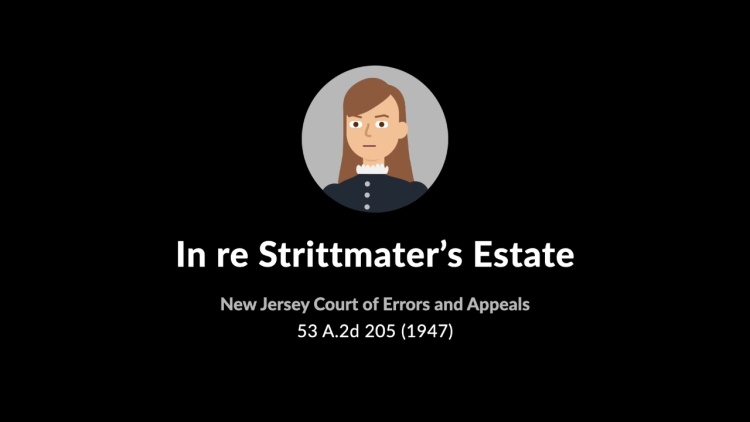In re Strittmater’s Estate
New Jersey Court of Errors and Appeals
53 A.2d 205 (1947)

- Written by Christine Raino, JD
Facts
Louisa F. Strittmater executed her will on October 31, 1944, devising her estate to the National Woman’s Party (the party). She died shortly after, on December 6, 1944. Her only surviving relatives were cousins with whom she had infrequent contact. Her will was challenged after submission to probate on the ground that Strittmater was insane. Evidence included the testimony of Strittmater’s long-term physician, a general practitioner who believed Strittmater suffered from a split-personality type of paranoia. The evidence showed that later in her life, despite having held her parents in high regard until and after their deaths, Strittmater’s love for her parents had turned into hatred. Evidence, primarily from notes written in the margins of books, showed that Strittmater vehemently hated men as a class and had become staunchly feminist. Additional evidence showed that she destroyed a clock, killed a kitten, and used profane language. Strittmater joined the party in 1925 and volunteered for the party between 1939 and 1941, during which time she stated her intention to leave her estate to the party. Strittmater’s dealings with her attorney and her bank, on the other hand, were normal. The decree of the New Jersey Prerogative Court admitting Strittmater’s will to probate was appealed to the Essex County Orphan’s Court, which found Strittmater insane and invalidated the will. That ruling was appealed to the New Jersey Court of Errors and Appeals.
Rule of Law
Issue
Holding and Reasoning (Per curiam)
What to do next…
Here's why 907,000 law students have relied on our case briefs:
- Written by law professors and practitioners, not other law students. 47,100 briefs, keyed to 996 casebooks. Top-notch customer support.
- The right amount of information, includes the facts, issues, rule of law, holding and reasoning, and any concurrences and dissents.
- Access in your classes, works on your mobile and tablet. Massive library of related video lessons and high quality multiple-choice questions.
- Easy to use, uniform format for every case brief. Written in plain English, not in legalese. Our briefs summarize and simplify; they don’t just repeat the court’s language.





